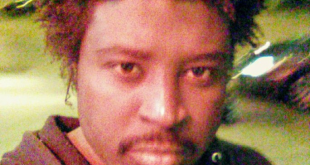The trouble began when police officers showed up at Ellen’s house late one night.
Her ex-boyfriend contacted police and requested a wellness check on their young daughter. But police didn’t find anything wrong with the girl, said Ellen.
But then, she said, he became obsessive. He continued requesting wellness checks on the little girl even though police never found anything wrong. In a court filing, Ellen said he would call and text so much — he even started sending letters to her house every day — that she felt like she was being stalked. (WBEZ is identifying her with a pseudonym for her family’s safety.)
She said even the cops eventually got sick of coming out and suggested she get a restraining order against her ex.
With the order of protection in place, Ellen said she also changed her cell phone number and email address. She even bought a new car with a new license plate — all to make it harder for her troublesome ex to contact her.
But a few months later, Ellen’s ex obtained all that information — and much more — without her knowing.
That’s because he opened a court case to which Ellen wasn’t even a party, then subpoenaed the Illinois Tollway for I-Pass transponder records that would show her movements on the state’s tollways.
The tollway complied with that legal request, and also turned over information about Ellen’s new cell phone number, email address, credit card and license plate. Ellen’s ex-boyfriend also requested similar private information about her parents, and the tollway turned all of it over — without ever notifying Ellen or her family.
“It’s scary when these government agencies, like the tollway or places that have what feels like nearly unlimited access to my whereabouts or my child’s whereabouts, are careless with the information,” she said.
Even though Ellen had an order of protection against her ex-boyfriend, he was able to obtain the contact personal and contact information from her I-Pass account.
Manuel Martinez/WBEZ
Even though Ellen had an order of protection against her ex-boyfriend, he was able to obtain the contact personal and contact information from her I-Pass account.
The Illinois Tollway regularly receives court-enforced requests for information — called subpoenas — relating to drivers’ movements on the roads. WBEZ obtained 117 subpoena requests from a 14-month timeframe made by local police departments, federal prosecutors and even private divorce attorneys looking to track what their clients’ exes are up to.
But a case like Ellen’s has some privacy advocates raising questions about the ease with which someone’s movements and private information can be accessed through the tollway. One veteran divorce lawyer said there’s a “treasure trove” of data available to anyone who can file a lawsuit and write a subpoena.
“This is supposed to be a program that collects money for when you drive on the roads,” said Karen Sheley, an attorney with the American Civil Liberties Union of Illinois.
“It should not be a system that allows the government to turn over to private litigants detailed information about your whereabouts, and to the extent that it is, people should know that. I would call it mission creep,” she said.
It’s not clear whether the tollway has ever rejected any subpoena for its customers’ data. The agency did not address a list of WBEZ’s questions for this story, but responded with written statements.
In one, Illinois Tollway Executive Director José Alvarez said he’s “very open and interested in working with lawmakers” and vowed to examine I-Pass privacy issues.
Additionally, Illinois Tollway spokesman Daniel Rozek wrote in an email that all state agencies — including the tollway — must comply with subpoenas, according to state law. Tollway attorneys, he wrote, “take great care in carefully handling customer information and ensuring the Illinois Tollway adheres to applicable law.”
“The Illinois Tollway works tirelessly to protect the information of our customers,” Rozek wrote. “We do not share customer information with third parties including individuals, marketers, retailers or vendors unless compelled to by a court order or other court process.”
Ellen said she isn’t concerned that the tollway tracks her movements. It’s how readily available so much of her information was to someone she’d gone to great lengths to block from her life.
“When the tollway first came out with the transponders, and I heard people talking about how it was going to be used to track us and it was dangerous, I laughed those ideas off as conspiracy theories,” Ellen said. “It’s dangerous we’re accumulating [I-Pass data] when there’s no protection of it and it can be subpoenaed so easily.”
“The perfect storm of loopholes”
Ex-Gov. Rod Blagojevich campaigned on bringing open-road tolling to Illinois in 2005 to reduce congestion and speed up toll payments. The Illinois Tollway reported it has issued 6.8 million I-Pass transponders, and that 90% of all toll transactions are now electronic. Tollway drivers even pay a discounted rate when they use I-Pass instead of tossing loose change into the toll basket.
Illinois’ open road tolling is a part of E-ZPass, which is an interstate electronic toll collection system in 17 states east of the Mississippi River. As a result, drivers can travel from Chicago to Boston using the same toll transponder.
But privacy wasn’t the focus as Blagojevich pushed for open-road tolling. And for as long as I-Pass has been in Illinois, attorneys tell WBEZ that law enforcement and private civil attorneys have been getting drivers’ movement data through court-enforced subpoenas.
In civil matters, such as divorce proceedings, information about an individual’s movements are not available outside of a subpoena, which can only be issued as part of a court process. People can’t obtain I-Pass records through the state’s public records law.
The Illinois Tollway’s privacy policy says the agency will turn over I-Pass data to “any individual who has a warrant, subpoena, or lawful order from a court of competent jurisdiction.”
But it doesn’t say whether the agency notifies customers when it turns over their private information that was requested via subpoena. And the tollway didn’t respond to a question about whether it notifies customers.
“It’s like the perfect storm of loopholes,” Ellen said.
The tollway also did not address WBEZ’s specific questions about Ellen’s case.
Stay up-to-date with the latest news, stories and insider events.
SIGN UP
In the 14 months of subpoenas obtained by WBEZ, many of the requests for I-Pass records in civil matters were divorce cases. Seasoned divorce attorneys said they can use transponder location data to confirm the dubious movements of an ex-spouse.
Longtime Chicago area divorce attorney Elizabeth Feely said it’s now old-fashioned — and expensive — to hire private investigators. But issuing subpoenas to the tollway can be a quick and easy way to prove what someone is up to.
“For a $25 check and the cost of having a lawyer prepare a subpoena, you can get a treasure trove of information,” Feely said.
For example, Feely subpoenaed records in a 2018 case to prove her client’s ex-wife had a job she was not disclosing. In a separate case, another divorce lawyer told WBEZ that a client didn’t have to pay alimony to an ex-husband after tollway records helped prove he was living with a girlfriend.
“It’s an underutilized tool to really surveil someone,” Feely said.
Law enforcement gets “creative” with I-Pass data
But it’s law enforcement, not private lawyers, who most frequently request individuals’ I-Pass data, according to state records. The information was used in cases ranging from stolen vehicles and bank robberies to gun-running, murder and child sex trafficking.
“There’s some pretty smart people working for the Department of Justice and for the FBI and the DEA and the other agencies, and certainly they’re gonna try to be creative — hopefully within the bounds of the law — to get information to further their investigations,” said Steven Block, a former Chicago federal prosecutor who now practices law at Thompson Hine.
Block said he frequently relied on I-Pass information as part of criminal investigations, but rarely, if ever, did he present it at trial. Instead, it would help establish patterns, or provide information about a credit card tied to an I-Pass account.
But Darryl Goldberg, a criminal defense attorney whose client’s I-Pass records were subpoenaed by the U.S. attorney’s office in Chicago in October 2018, questions the ease with which prosecutors can obtain this information.
Goldberg points to a U.S. Supreme Court decision last year that said police must generally get a warrant in order to track someone’s location through their cell phone records. He argued that tracking I-Pass location data is “essentially GPS tracking, long-term surveillance, which requires a warrant.”
But Block, the ex-federal prosecutor, disagreed. He said I-Pass data don’t show nearly the breadth of information as cell phone data. Therefore, he said, I-Pass records and cell phone data shouldn’t be held to the same standard.
“I understand the desire of individuals to have privacy, particularly in the society we live in now where we all feel like our data is very much out there,” Block said. “However, when used as a legitimate law enforcement tool as part of a investigation by a grand jury, I think it’s an appropriate tool for law enforcement to use.”
“I take privacy and safety very seriously”
WBEZ’s reporting on how the Illinois Tollway releases drivers’ private information — especially in civil and divorce cases — raised questions among some privacy advocates, an Illinois state lawmaker and even the agency’s own leader.
“The Tollway is very open and interested in working with lawmakers on additional ways for all agencies to protect sensitive customer information,” Alvarez said in a statement. “I take privacy and safety very seriously, and will be looking at this issue closely.”
State Rep. Joe Sosnowski, R-Rockford, led the passage of a 2013 law that made it illegal to secretly put a GPS tracking device on a vehicle.
That law, Sosnowski said, stemmed from a bitter divorce case. When asked about the tollway releasing I-Pass data for civil cases, he said, “I think that’s probably something the legislature needs to look at in the future and see how we compare with other states and if that’s common practice or not.”
In response to questions about how easily accessible I-Pass information is, llinois Tollway Executive Director José Alvarez said he wants to work with state lawmakers on "additional ways for all agencies to protect sensitive customer information.”
Manuel Martinez/WBEZ
In response to questions about how easily accessible I-Pass information is, llinois Tollway Executive Director José Alvarez said he wants to work with state lawmakers on “additional ways for all agencies to protect sensitive customer information.”
California state law specifically addresses law enforcement’s use of tollway movements, requiring police to get a warrant to obtain someone’s toll records. Law enforcement must even notify the person within five days that their data has been shared, unless the warrant requests secrecy.
Former Democratic California State Sen. Joe Simitian, who led the passage of that law, said locational privacy is less debated than other privacy issues, but more states should take up the cause.
He said divorce cases are different than criminal cases, and so there must be parameters around collecting data about millions of law-abiding Americans.
“It’s like that little connect-the-dots game that was in the Highlights book in the dentist office when I was a kid,” he said. “If you can connect all the dots, then all of a sudden the dots paint a picture and they can give a pretty clear presentation of what your life looks like and that’s something that shouldn’t be shared unless someone makes a conscious judgment they want to share it.”
Simitian argued one way to restrict the accessibility of tollway transponder data — particularly in civil matters — is to require tollways to regularly destroy the data after a few years.
“If you have [the data] then it can be misused,” he said.
But Simitian, who’s now the county board president in Santa Clara County, said all states should develop policies about how toll customers’ data is released.
“I understand the first business of a toll collection agency is to collect tolls,” Simitian said. “But we’ve gotta expect these organizations, if they’re gonna collect this data, to be sensitive to their responsibilities in terms of privacy and due process even as they’re listening to the clink clink clink of the coins coming in. Or the click click click of the credit cards, whatever it may be these days.”
Ellen said she now thinks about her ex-boyfriend every time she drives through a toll, wondering if he’s still able to monitor her movements. She believes it’s the Illinois Tollway’s responsibility to safeguard its customers’ data.
“It makes me think twice about driving on the tollway, which means that I have to seriously rearrange my life to avoid that fear, which means that he’s winning,” she said.
 News Chicago Business, Info & Events
News Chicago Business, Info & Events









